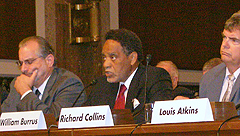June 23, 2010
USPS Must Expand, Not Cut, Service
Predicting that mail volume will grow in 2012, APWU President William Burrus told lawmakers June 23 that slashing service will not solve the Postal Service’s current financial difficulties. The APWU “believes the USPS can and must expand the services it offers,” he said.
“No service-oriented business can grow by reducing service,” Burrus told the Senate Subcommittee on Federal Financial Management, Government Information, Federal Services, and International Security, and the House Subcommittee on the Federal Workforce, Postal Service, and the District of Columbia.
Burrus testified on behalf of the APWU at the joint congressional hearing to examine the difficulties currently facing the Postal Service and on postal management’s plans to address them.
“The APWU has analyzed the current state of hard-copy communication, and we reject the projection that is currently in vogue — that mail is destined to perpetually decline,” he said. He told lawmakers that this projection serves as “the basis for recommendations for radical changes to the USPS structure and to the services we offer.
“This includes the poster child for service reductions, the elimination of Saturday delivery,” he said. “We should not even engage in serious discussion of this proposal.”
A Flawed Business Model, Problematic Law
Instead of cutting service, Burrus asked lawmakers to eliminate excessive worksharing discounts. These discounts are “illegal and self-defeating,” he said.
Worksharing discounts “deprive the Postal Service of desperately needed revenue and subsidize major mailers at the expense of small businesses and individual citizens,” he told the subcommittees.
Burrus also told lawmakers that the Postal Service’s business model, a creation of the 2006 Postal Accountability and Enhancement Act (PAEA) is flawed. Less than four years after the law’s adoption, many of the groups that supported the PAEA are again denouncing the USPS business model.
“Those who advocated the passage of the PAEA must take responsibility for the results,” Burrus said. “The GAO [Government Accountability Office], the Office of Inspector General, congressional committees, mailers’ associations and others ‘drank the Kool-Aid’ of ‘postal reform’ and now are offering solutions to problems they created.”
Burrus urged lawmakers to rescind an onerous mandate included in the PAEA that requires the USPS to “pre-fund” billions of dollars annually for 10 years for future retiree healthcare liabilities. This requirement is driving the Postal Service to the brink of insolvency, he said.
“There seems to be unanimous agreement within the postal community that the pre-funding obligation is the primary source of the USPS’ financial difficulties and that it must be corrected,” Burrus said.
Growth in Mail Volume
Burrus rejected the predictions made by the Postal Service that mail volume will continue to decline, and instead predicted that the opposite is true. The union’s evaluation signals that mail volume will experience growth in Fiscal Year 2012.
The union president asked lawmakers to make note of his prediction and to revisit the issue in 2013.
“If we are right in our prediction that volume will grow in the relatively near future, those dire predictions must be discarded as the alarmist projections they are,” he said.
The subcommittee held its June 23 hearing, titled “Having Their Say: Customer and Employee Views on the Future of the U.S. Postal Service,” to hear the opinions of those directly affected by the Postal Service’s dire financial situation and its proposals to cut service.
Also testifying at the hearing were Don Cantriel, President, National Rural Letter Carriers Association; Frederic Rolando, President, National Letter Carriers Association; Richard Collins, Assistant to the President, National Postal Mail Handlers Union; Louis Atkins, Executive Vice President, National Association of Postal Supervisors; Charles Mapa, President, National League of Postmasters; Robert Rapoza, President, National Association of Postmasters of the United States; as well as major mailers representatives and other postal “stakeholders.”



